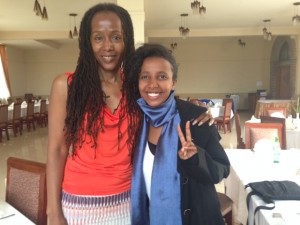By Jacquelyn C.A. Meshelemiah
Associate Professor, Ohio State College of Social Work
“This is Africa!”
I have heard the expression, “This is Africa!” repeatedly over the last week while conducting research here in Gondar, Ethiopia.
I came here to collect data from Key Opinion Leaders (KOLs) on Tenofovir, a microbicide gel used to prevent HIV infection. It is in clinical trials in South Africa. The data collection is part of joint research project among Ohio State’s Colleges of Social Work and Nursing and the Department of Social Work at Gondar.
We most certainly hope to pilot Tenofovir in Ethiopia should the second trial in South Africa confirm the original results. It will be a few years in coming, but we are conducting the research here to assess Ethiopia’s readiness for Tenofovir gel in the future.
The people I’ve interviewed include social workers, nurses, public health personnel, internists, HAPCO workers, OB/GYNs, health extension workers, and other relevant personnel. My colleague, Mr. Semalegne Kendie Mengesha, and I collected a lot of data!
What I received was far more than rich data. I received an important lesson on time and patience.
Gathering rich data from 12 KOLs in Gondar took months of proposal writing/IRB prep work, weeks of pre-scheduling semi-structured interviews, contacting more than 25 potential KOLs, double and triple confirmations of appointments to complete the interviews, and then bracing for the “Wait.”
Despite confirming appointments just hours or even sometimes just minutes before a confirmed appointment, Mr. Semalegne and I often found ourselves waiting, waiting, and even more waiting more than 50% of the time for participants to arrive at the agreed upon destination.
I found this pattern to be very surprising and initially very frustrating. My reference to the Biblical character Job became a daily ritual. (Job is known for his extreme patience.) Although the demands for my patience were nowhere nearly as intense as what was required for Job, I had to dig deep for my patience.
At the same time, my waiting resulted in numerous fruitful conversations about norms related to Ethiopian culture. So, rather than perseverate over what I was repeatedly exclaiming as “Loss time!!!” I decided to spend time trying to understand why time was relative and how waiting could be used constructively.
Eventually, I decided it was best to stay put when a participant was running late, even if it meant waiting 20, 30, or 45 minutes for the participant to arrive. Besides, it did not make sense to shuffle back and forth between the hospital and Taye Belay hotel in a bajaj.
Again, many participants were on time. It was the other 50+% who showed up late or not at all that resulted in contact with more than 25 participants just to get the 12 I had intended to interview. All of the no-shows did eventually text or call within one to six hours after our appointments. That gave me some comfort and increased my patience, just a bit.
By the end of my research week, I was psychologically prepared to wait, and with patience. I knew, based on the earlier interviews that we had completed, that we were going to get rich data and the undivided attention of the research participants once we were able to sit before them and start the tape -recording.
Now back to my point: “This is Africa!”
Yes, it is. Time is relative for most. It is not an attempt to be disrespectful or inconsiderate. It is what it is.
I got the research done, formed some new relationships, developed some patience and learned what “This is Africa!” means.
I love Africa – all of it – even the part that makes me want me to scream and say, “Let’s start on time,” but then again, what is “on time” for me is not always the same thing for others.
“This is Africa!”




EVERYTHING IS HEAVY IN AFRICA. IF YOU EXPLORE MORE THINGS STAYING A LITTLE LONGER TIME THAN THIS, DEFINITELY SURE, YOU WILL HAVE MORE SURPRISING CHALLENGES. ANYWAYS, AS YOU SAID, PATIENCE IS A GOOD VIRTUE.